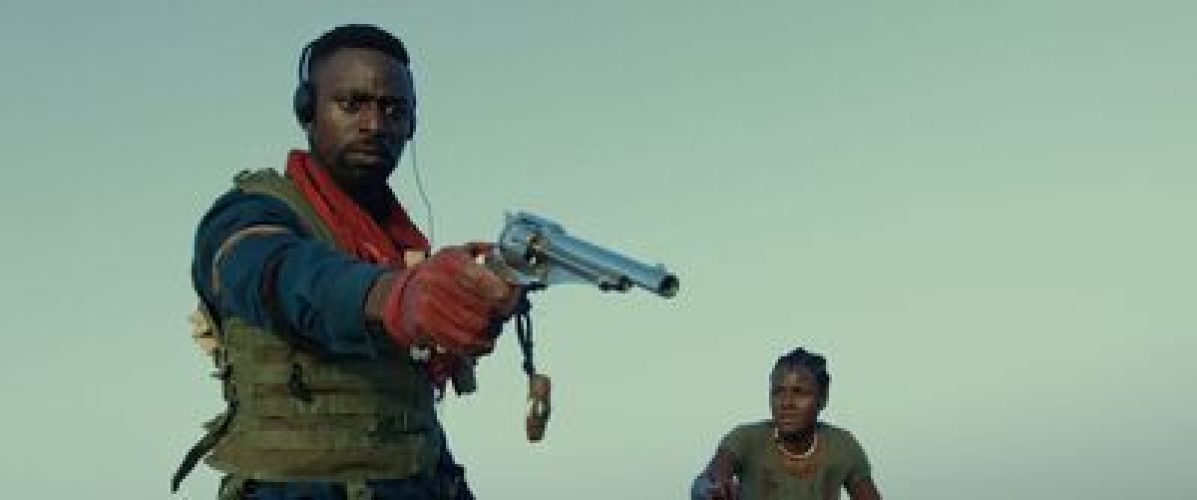“Revenge is like a river,” a woman says in voiceover at the beginning of the movie. Her next words give more detail to the simile, but it’s not until the very end of this unsettling, absorbing thriller that her thought is completed, so to speak—over a very convincing visual depiction.
Written and directed by Congolese filmmaker Jean Luc Herbulot (based on story he created with producer Pamela Diop), “Saloum” begins with some uncomfortable visuals and contextual narration. The guys we will know as our main characters walk among dozens of slaughtered dead—some of the bodies are of kids—and load up on treasure. The year is 2003, and the narrator speaks of the coup in Guinea-Bissau, and of semi-mythical modern pirates called Bagnui’s Hyenas.
There will not be a quiz later. While the historical content is important, once we’re on a plane with these guys, the Mexican drug dealer they’ve kidnapped, and a bunch of gold bars we’re into a universal story: desperate men trying to make it rich. And soon circumstances force them to land. The small band’s leader, Chaka (Yaan Gaal), sets down near a place he knows, a place where the gang can lay low for a while.
This place is called Saloum, and as resorts go, it’s pretty lo-fi. Travelers pay their way by pitching in with chores, which doesn’t sit well with a couple of the gang’s more hardened fellow. The place’s proprietor is an avuncular-seeming fellow named Omar (Bruno Henry), and Chaka says they’ve met before. Omar doesn’t remember. But he will. In the meantime, he and his crew have to contend with the suspicions of the other guests, including one mute woman named Awa (Evelyne Ily Juhen), who threatens Chaka with exposure at their first communal meal. She speaks in sign language, which most of the Hyenas understand because they’ve all worked in some form of mining before—figure it out. This kind of detail is culturally enlightening for us Westerners but that’s not really its intended function; instead, it makes the nightmare world the movie will soon escort us into that much more credible.
Which is to say that even before the supernatural element kicks in, “Saloum” excels at telling a story you think you know, but you really don’t. These “Hyenas” are arguably “bad” men, but some are bad men with good reasons (in the spirit of some of Robert Aldrich’s movies including “The Dirty Dozen”). Chaka, haunted by flashbacks of a childhood in chains, is back at Saloum for a reason.
But he’s ignorant of the forces at play, which threaten not just the Hyenas but everyone in the resort, in the village, the region. And when he makes his move, he unleashes those forces. Which manifest themselves in some eye-popping deaths and even more eye-popping swarms.
Herbulot’s direction has not just energy to spare but a truly advanced and accomplished perspective. As a result, he makes even old genre sights—like a flashlight beam scouring a darkened room—look almost new again. This is one of the most satisfying films, genre or otherwise, of the year.
Now playing in select theaters and available on Shudder on September 8th.
”Revenge is like a river,” a woman says in voiceover at the beginning of the movie. Her next words give more detail to the simile, but it’s not until the very end of this unsettling, absorbing thriller that her thought is completed, so to speak—over a very convincing visual depiction. Written and directed by Congolese filmmaker Jean Luc Herbulot (based on story he created with producer Pamela Diop), “Saloum” begins with some uncomfortable visuals and contextual narration. The guys we will know as our main characters walk among dozens of slaughtered dead—some of the bodies are of kids—and load up on treasure. The year is 2003, and the narrator speaks of the coup in Guinea-Bissau, and of semi-mythical modern pirates called Bagnui’s Hyenas. There will not be a quiz later. While the historical content is important, once we’re on a plane with these guys, the Mexican drug dealer they’ve kidnapped, and a bunch of gold bars we’re into a universal story: desperate men trying to make it rich. And soon circumstances force them to land. The small band’s leader, Chaka (Yaan Gaal), sets down near a place he knows, a place where the gang can lay low for a while. This place is called Saloum, and as resorts go, it’s pretty lo-fi. Travelers pay their way by pitching in with chores, which doesn’t sit well with a couple of the gang’s more hardened fellow. The place’s proprietor is an avuncular-seeming fellow named Omar (Bruno Henry), and Chaka says they’ve met before. Omar doesn’t remember. But he will. In the meantime, he and his crew have to contend with the suspicions of the other guests, including one mute woman named Awa (Evelyne Ily Juhen), who threatens Chaka with exposure at their first communal meal. She speaks in sign language, which most of the Hyenas understand because they’ve all worked in some form of mining before—figure it out. This kind of detail is culturally enlightening for us Westerners but that’s not really its intended function; instead, it makes the nightmare world the movie will soon escort us into that much more credible. Which is to say that even before the supernatural element kicks in, “Saloum” excels at telling a story you think you know, but you really don’t. These “Hyenas” are arguably “bad” men, but some are bad men with good reasons (in the spirit of some of Robert Aldrich’s movies including “The Dirty Dozen”). Chaka, haunted by flashbacks of a childhood in chains, is back at Saloum for a reason. But he’s ignorant of the forces at play, which threaten not just the Hyenas but everyone in the resort, in the village, the region. And when he makes his move, he unleashes those forces. Which manifest themselves in some eye-popping deaths and even more eye-popping swarms. Herbulot’s direction has not just energy to spare but a truly advanced and accomplished perspective. As a result, he makes even old genre sights—like a flashlight beam scouring a darkened room—look almost new again. This is one of the most satisfying films, genre or otherwise, of the year. Now playing in select theaters and available on Shudder on September 8th. Read More


